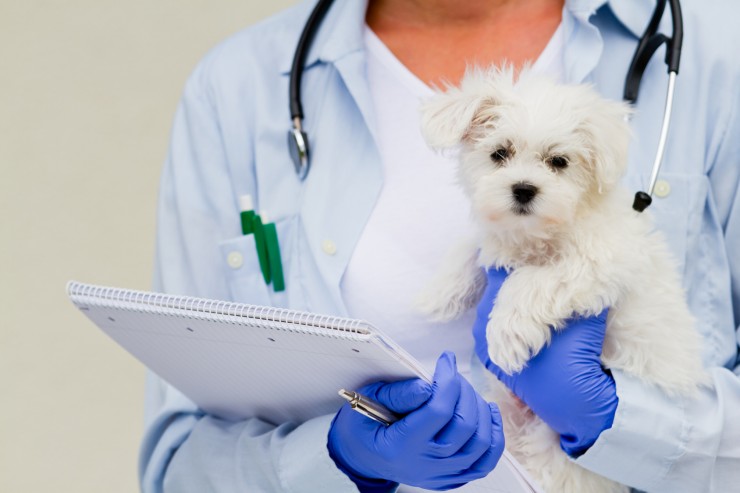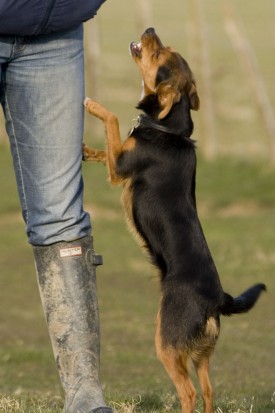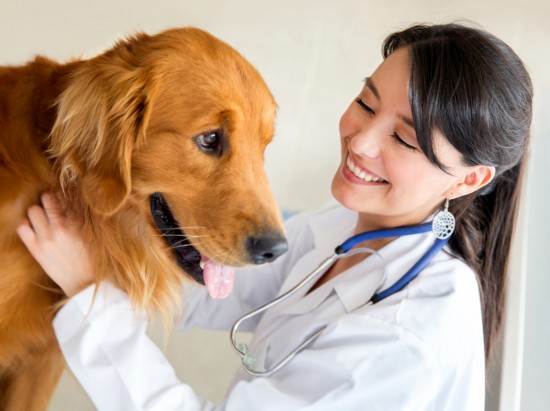

There's no time more exciting than when you've decided to get a puppy and finally introduce them to their new home. Puppies should be between eight and twelve weeks old when they leave their mothers and littermates and they should have been given their first vaccinations too. The question most owners ask is when should they take their new puppies to the vet for their very first check-up and the answer is at the earliest opportunity possible.
It's always a very good idea to have a new puppy checked out by a vet as soon as you have bought or adopted them. It is recommended that you do this as part of the buying/adoption process and agree with the seller that you can take the puppy back within a set time period (around 48 hours) if you are not happy after the vet check. Not only will it benefit them, but it will give you peace of mind that your puppy is happy and healthy. The vet would be able to give them a thorough examination to make sure they are in good condition and to establish they don't have fleas or are carrying any harmful intestinal parasites which would have been passed on to them from their mothers.
The very first check-up is all-important because the vet would be able to set up a vaccination programme for your puppy to ensure they are fully vaccinated at all times once they've been given their initial jabs. The vet would ask for the puppy's records which the breeder should have given you when you picked them up which would allow them to work out the correct dates for puppy's follow up booster shots. The vet would also be able to read through existing health records to see if the puppy has received any other sort of veterinary treatment before being re-homed.
A puppy's first health check-up has to be a positive experience because they will need to be taken to the surgery at regular intervals to have the necessary vaccinations for all the diseases that can make them seriously ill or in a worst case scenario all too often prove fatal to unvaccinated puppies and young dogs. Puppies need to have their shots at precise times which typically start when they are between 6 to 8 weeks old and they finish when a puppy is about four months old.
The most important vaccinations are referred to as "core" vaccines which are essential because they offer puppies crucial protection against nasty and fatal diseases namely distemper and parvo. Once a puppy has had their shots, they are far less at risk of contracting either of these diseases. If a puppy has not been vaccinated and they come into contact with the virus, they'll quickly get very sick and if not treated, they will succumb to the disease and even when treated in time there is not guarantee they will survive.
It's really important to set up a worming programme for a new puppy and the best person to talk to is the vet who would be treating and looking after your new canine friend should they ever fall ill or injure themselves in any way. If your puppy has a large belly when you first get them, the chances are they may already have intestinal worms and in particular roundworm which they would have picked up from their mothers. The vet would be able to prescribe a good treatment on their first visit after which time, puppies typically need to be wormed every few weeks to keep on top of things.
The vet might suggest taking faecal samples on a regular basis which is a good idea if you have young children in the house and decide to share your home with a little puppy. Regularly worming a puppy keeps them nice and healthy, but it also offers a lot of protection for everyone in the home too.
Although vets are not trained as canine behaviourists, they are more than able to offer the right sort of advice on the importance of early socialisation especially in the first few weeks and months of a puppy's life. Failing to do this can seriously impact not only your puppy's behaviour and their confidence, but it can seriously impact the lives of everyone who shares a home if your puppy turns out to be a neurotic or fearful mature dog. It can make things miserable for all concerned especially your dog.
It's a well known fact that puppies are at their most receptive in the first weeks and months of their lives which is why it's so important to gently introduce them to all the things and people they are going to typically meet during the course of their lives. A well socialised puppy grows up to be a well-balance, happy and confident character and one that's a pleasure to have and be around.
Getting a home ready for the arrival of a new puppy is a very exciting experience and it pays to be well prepared. Puppies are lively, full of energy and will get themselves into all sorts of messes as they learn about the world about them. In short, you have to puppy proof your home to make sure your new little canine friend doesn't injure themselves or escape into the great outdoors before they've had all their vaccinations. One of the questions new puppy owners ask is when they should arrange for their pets to have their first check-up at the vets and as explained above, the early this is done the better.
 Basset Hound Health Considerations
Basset Hound Heal
Basset Hound Health Considerations
Basset Hound Heal
 Attention Seeking Dogs
Attention Seeking
Attention Seeking Dogs
Attention Seeking
 Dog Pig Hunting – How to get started
Dog Pig Hunting – How to get started
Hunting p
Dog Pig Hunting – How to get started
Dog Pig Hunting – How to get started
Hunting p
 The Best Timber Chicken Coops For Your Poultry Business
The Best Timber Chicken Coops For Your Poultry Business
The Best Timber Chicken Coops For Your Poultry Business
The Best Timber Chicken Coops For Your Poultry Business
 Ten Questions To Ask Your Vet During Your Dog’s Annual Check-up
Ten Questions To
Ten Questions To Ask Your Vet During Your Dog’s Annual Check-up
Ten Questions To
Copyright © 2005-2016 Pet Information All Rights Reserved
Contact us: www162date@outlook.com